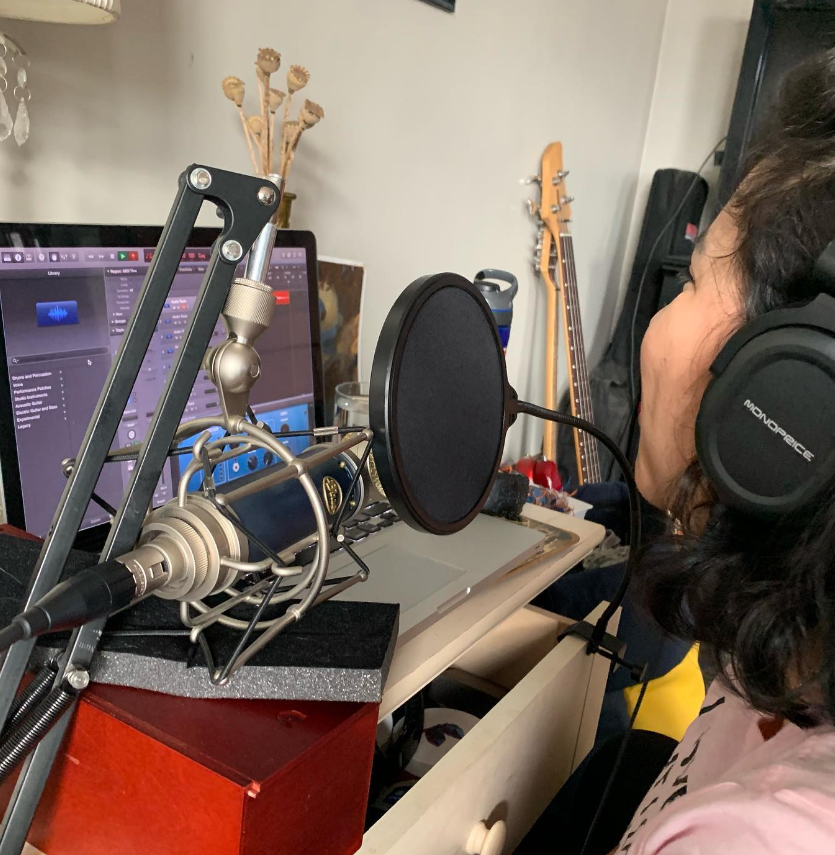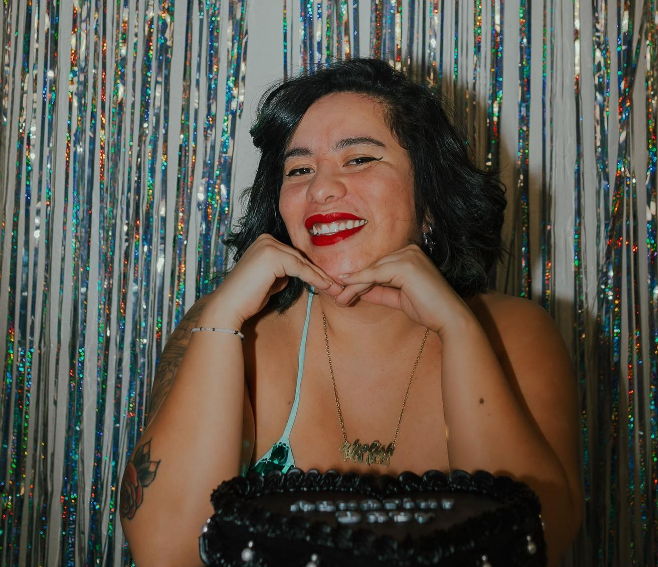“Welcome back to ‘A Shot of Truth’ podcast. A podcast dedicated to building a network focused on knowledge sharing, celebrating, and storytelling for and with undocumented people. I’m your host, Victoria Matey, and it’s time for a shot of truth.”
These are the words that greet anyone who tunes into this podcast, which has produced more than 100 episodes since it started in 2018. Behind the warm, genuine voice is a multifaceted individual deeply dedicated to teaching about and facilitating learning within the undocumented community.
Victoria Matey, the host of “A Shot of Truth,” is a queer, undocumented creator and community educator based in Bellingham, Wash. She is also a friend, a mentor, a mother, and an activist.

Since she was young, Matey has been aware of and open about her undocumented status. Starting in middle school, she began to use class presentations and projects to teach about the undocumented experience and to understand it herself.
When she entered Western Washington University (WWU), she became active in the newly established Blue Group, a university organization supporting undocumented students.
Matey said the idea to start a podcast came from Caleb Nelson, a friend who is also the current production lead and editor of “A Shot of Truth.” It began as a passion project for Matey, Nelson, and former co-host Olga Araceli.
Since then, it has blossomed into a space of creation and storytelling by and for undocumented individuals across the country.
“Our weekly outings together — having drinks at the bar and talking about random things, turned into building an entire podcast that has over 25,000 downloads and has connected me to people all over the nation that I’ve gotten to really understand in a different way,” Matey said. “It has shifted so much of who I am.”
“A Shot of Truth” challenges the narratives of the undocumented immigrant experience in today’s news media.
For instance, in 2022, Matey did an episode with Ju Hong, the host of the podcast “ImmigrAsians,” shedding light on the struggles of undocumented Asian immigrants.
In the episode “Queer in Texas,” Luis Rosales, the founder of the Love&Fear Foundation, discusses his experience growing up undocumented and queer in a conservative state and how its racist, machismo culture affected him.
The show’s kaleidoscope of individuals and experiences and its more complete view of undocumented individuals are byproducts of Matey’s goal for the podcast.
“At the end of the day, I don’t do it for the people that I need to convince or the people that have their doubts or negative inputs,” Matey said. “I do it to create a safe space for undocu folks and DACA recipients to talk about what they’re going through and what is on their mind and how they want to share that with the world.”
That includes Matey herself.
In the most recent episode of “A Shot of Truth,” she tells the story of her experience returning to Mexico for the first time in 27 years and soon after the death of her father. It is a profoundly candid and vulnerable episode that weaves Matey’s personal story with the greater socio-political context surrounding it.
“It always surprises me how open she is about a lot of stuff, like very heavy topics,” said Tania Dominquez-Rangel. “She’s not afraid to really talk about it, and through that, I’ve learned the importance of being vulnerable when you’re making connections. It’s very important that you can be vulnerable so people can be vulnerable with you, too.”
Dominquez-Rangel is a Latina filmmaker currently based in Los Angeles and a previous guest on “A Shot of Truth.” On the podcast, Dominquez-Rangel talked about her filmmaking and podcasting and how being a DACA recipient impacted her school life and her artistic work.
She followed the podcast before she met Matey, and she said that collaborating with Matey taught her a lot about the technical and human sides of podcast hosting.
Matey posts episodes of “A Shot of Truth” when inspiration strikes and time allows, which Dominquez-Rangel said soothed her preoccupation with the branding and consistency of her podcast.
“Working with Vicky, it was: prioritize the authenticity,” said Dominquez-Rangel. “Prioritize the conversation. Even if that means you can’t have a guest every week, or even every month, what’s important is getting those stories out.”
In addition to hosting “A Shot of Truth,” Matey works as a fellowship lead and community engagement coordinator for the Cultural Leadership Fellowship, a program run by Washington state-based nonprofit Scholar Fund that gives undocumented individuals the opportunity to engage in learning through international travel. Matey started as a fellow herself when she traveled with the program’s pilot group to Guatemala in early 2023.
Alejandra Pérez is a trip lead and the director of education strategy at the fellowship. Pérez founded the program with friend and colleague Yuriana Garcia Tellez to give undocumented individuals no longer in school an opportunity to travel abroad.
“You know how to get work done, and you do it in such a compassionate and people-centered way that it comes out just very beautifully,” Pérez said about Matey.
Through “A Shot of Truth” and Matey’s other community-engaged work, she has touched the lives of many people and exposed many more to the intersectional struggles of undocumented individuals.
While she does not know when the next episode of “A Shot of Truth” will air, it will undoubtedly be as authentic and impactful as everything Matey has undertaken so far.
“That was ‘A Shot of Truth.’ Until next time.”
Cover Photo: A portrait of Victoria Matey, the digital creator and community educator behind the “A Shot of Truth” podcast, posted on the podcast’s Instagram, @shotoftruthpodcast, on Feb. 3, 2023. Matey began in the podcast in 2018 with friends Caleb Nelson and Olga Araceli. (Courtesy of Victoria Matey)
Isabel Smith is a second-year student at the University of Washington completing a double major in journalism and public interest communication and political science. They are dedicated to using historical and political context to more comprehensively report on the joy and challenges of marginalized communities.
Publisher’s Notes: Washington Latino News and a class in the Journalism and Public Interest Communication program at the University of Washington are partners in best serving the Hispanic and Latino communities.
